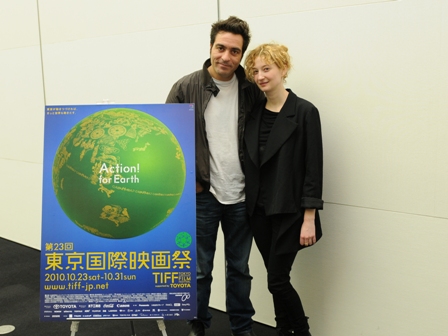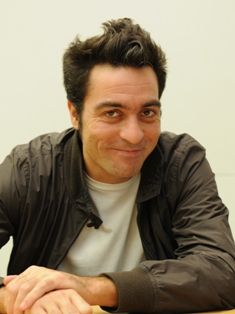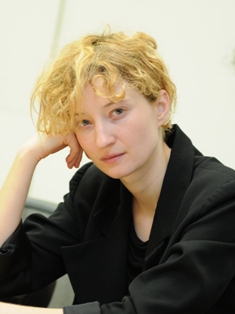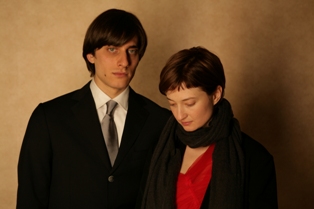2010.10.25
[Interviews]
ŌĆ£The Solitude of Prime NumbersŌĆØ Interview with Saverio Costanzo(Director), Alba Rohrwacher(Actress) (10/25)


©2010 TIFF
---The popular original story became the ultimate best seller of the year 2008 and has been translated to more than 30 different languages. The film makes the most of the original novel and still takes an advantage of the film characteristics to create the unique world. How was the response of the audience in Italy?
Director Saverio Costanzo :I think this occurs very often but, the readerŌĆÖs responses were divided. The readers who liked the original novel had mixed feelings of betrayed and the readers, who didnŌĆÖt think much about the original novel, experienced the film freely and felt the quality of the film.
---The reaction of the Japanese readers was to bring the curtain to the film with the happy end. The film you made seemed to understand the voice of the fansŌĆ”
Director Saverio Costanzo:I needed to bring an end to the story with two of them touching each other. It is not necessarily a happy ending. I think the last scene was that they lay their weapons down for the meantime.
---YouŌĆÖve co-written the screenplay with the writer of the original novel, Paolo Giordano, right? I thought youŌĆÖve nicely created the climax. Was it your idea to make revisions to the chronological sequence? Did you have a conflict of opinion with Giordano?
Director Saverio Costanzo:There is always a clash of opinion during the collaborative work. It basically proceeded smoothly. I made the film into a complicated structure so that I wouldnŌĆÖt shun the readers who experienced the story away. I had to display it in a different way. To conscientiously make it in to the film, there was a section in the story where I needed to change. Paolo Giordano has courageously given me a freedom in that respect too. But for Giordano, he must have had something to lose by doing so.
IŌĆÖve disconnected and revised the chronological sequence, but it brings out the memory of the film. We can lay the memory on childrenŌĆÖs image. It is the presence that we understand the memory of the childhood. We can understand something that we couldnŌĆÖt understand in the past in the presence.
---How did you co-write the screenplay?
Director Saverio Costanzo:We had a full one week of scriptwriting session and kept continuing that. It took one year to complete the screenplay. It was my idea to make a revision to the chronological sequence.

©2010 TIFF
---Mattia and Alice were just like the characters that I have imagined them to be in the original novel. TheyŌĆÖre portrayal of having a hidden strength inside even after being emotionally scarred, were excellently shown in the film. How did you organize the casting from the childhood to the younger days?
Director Saverio Costanzo: I walked the city of Trino looking for the children that looked like Alba and Luca. The most difficult thing was to find somebody who looked by them.
---Amongst the audience, the actor who played Mattia and Luca Marinelli, the actor who played Mattia during his younger days looked like they were brothers and this became a popular topic of conversation.
Director Saverio Costanzo: They arenŌĆÖt really brothers. We are fortunate. The mother of a child who played the childhood of Mattia began to cry when she saw Luca. It was almost like looking at her own child grow up.
---As the two of them became older, the appearance of the body changing is emphasized. When they reunite 7 days later, Alice had lost a lot of weight and Mattia had gained weight. I thought that their contrast looked humorous and sad as well. The actors must have gone through the big effort of doing this. ŃĆĆ
Alba Rohrwacher: Yes, it was certainly difficult, at the same time I think I was able to do a very meaningful job. It was more effective than using your head or do a psychological task, by specifically using the body and really feeling the pain with body; I think I can genuinely become that person that I am portraying.

©2010 TIFF
’╝łInterviewed by Miyuki Natsume’╝ē
The Solitude of Prime Numbers





